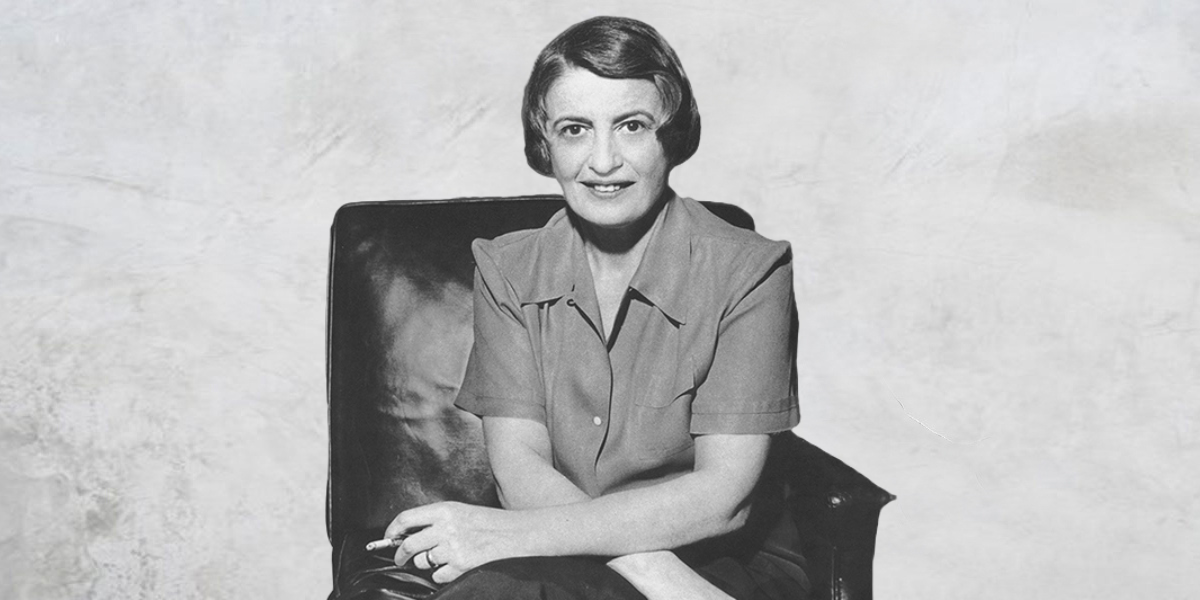
Big Thinker: Ayn Rand
Big thinkerSociety + CultureBusiness + Leadership
BY The Ethics Centre 7 OCT 2025
Ayn Rand (born Alissa Rosenbaum, 1905-1982) was a Russian-born American writer & philosopher best known for her work on Objectivism, a philosophy she called “the virtue of selfishness”.
From a young age, Rand proved to be gifted, and after teaching herself to read at age 6, she decided she wanted to be a fiction writer by age 9.
During her teenage years, she witnessed both the Kerensky Revolution in February of 1917, which saw Tsar Nicholas II removed from power, and the Bolshevik Revolution in October of 1917. The victory of the Communist party brought the confiscation of her father’s pharmacy, driving her family to near starvation and away from their home. These experiences likely laid the groundwork for her contempt for the idea of the collective good.
In 1924, Rand graduated from the University of Petrograd, studying history, literature and philosophy. She was approved for a visa to visit family in the US, and she decided to stay and pursue a career in play and fiction writing, using it as a medium to express her philosophical beliefs.
Objectivism
“My philosophy, in essence, is the concept of man as a heroic being, with his own happiness as the moral purpose of his life, with productive achievement as his noblest activity, and reason as his only absolute.” – Appendix of Atlas Shrugged
Rand developed her core philosophical idea of Objectivism, which maintains that there is no greater moral goal than achieving one’s happiness. To achieve this happiness, however, we are required to be rational and logical about the facts of reality, including the facts about our human nature and needs.
Objectivism has four pillars:
- Objective reality – there is a world that exists independent of how we each perceive it
- Direct realism – the only way we can make sense of this objective world is through logic and rationality
- Ethical egoism – an action is morally right if it promotes our own self-interest (rejecting the altruistic beliefs that we should act in the interest of other people)
- Capitalism – a political system that respects the individual rights and interests of the individual person, rather than a collective.
Given her beliefs on individualism and the morality of selfishness, Rand found that the only political system that was compatible was Laissez-Faire Capitalism. Protecting individual freedom with as little regulation and government interference would ensure that people can be rationally selfish.
A person subscribing to Objectivism will make decisions based on what is rational to them, not out of obligation to friends or family or their community. Rand believes that these people end up contributing more to the world around them, because they are more creative, learned, and can challenge the status quo.
Writing
She explored these concepts in her most well-known pieces of fiction: The Fountainhead, published in 1943, and Atlas Shrugged, published in 1957. The Fountainhead follows Howard Roark, an anti-establishment architect who refuses to conform to traditional styles and popular taste. She introduces the reader to the concept of “second-handedness”, which she defines living through others’ and their ideas, rather than through independent thought and reason.
The character Roark personifies Rand’s Objectivist ideals, of rational independence, productivity and integrity. Her magnum opus, Atlas Shrugged, builds on these ideas of rational, selfish, creative individuals as the “prime movers” of a society. Set in a dystopian America, where productivity, creativity, and entrepreneurship stagnate due to over-regulation and an “overly altruistic society”, the novel describes this as disincentivising ambitious, money-driven people.
Even though Atlas Shrugged quickly became a bestseller, its reception was controversial. It has tended to be applauded by conservatives, while dismissed as “silly,’ “rambling” and “philosophically flawed” by liberals.
Controversy
Ayn Rand remains a controversial figure, given her pro-capitalist, individual-centred definition of an ideal society. So much of how we understand ethics is around what we can do for other people and the societies we live in, using various frameworks to understand how we can maximise positive outcomes, or discern the best action. Objectivism turns this on its head, claiming that the best thing we can do for ourselves and the world is act within our own rational self-interest.
“Why do they always teach us that it’s easy and evil to do what we want and that we need discipline to restrain ourselves? It’s the hardest thing in the world–to do what we want. And it takes the greatest kind of courage. I mean, what we really want.”
Rand’s work remains hotly debated and contested, although today it is being read in a vastly different context. Tech billionaires and CEOs such as Peter Thiel and Steve Jobs are said to have used her philosophy as their “guiding stars,” and her work tends to gain traction during times of political and economic instability, such as during the 2008 financial crisis. Ultimately, whether embraced as inspiration or rejected as ideology, Rand’s legacy continues to grapple with the extent to which individual freedom drives a society forward.

BY The Ethics Centre
The Ethics Centre is a not-for-profit organisation developing innovative programs, services and experiences, designed to bring ethics to the centre of professional and personal life.
Ethics in your inbox.
Get the latest inspiration, intelligence, events & more.
By signing up you agree to our privacy policy
You might be interested in…
Opinion + Analysis
Politics + Human Rights, Relationships, Society + Culture
Of what does the machine dream? The Wire and collectivism
Opinion + Analysis
Business + Leadership, Science + Technology
The new rules of ethical design in tech
Opinion + Analysis
Society + Culture
Schools of thought: What is education for?
Opinion + Analysis
Business + Leadership, Relationships




